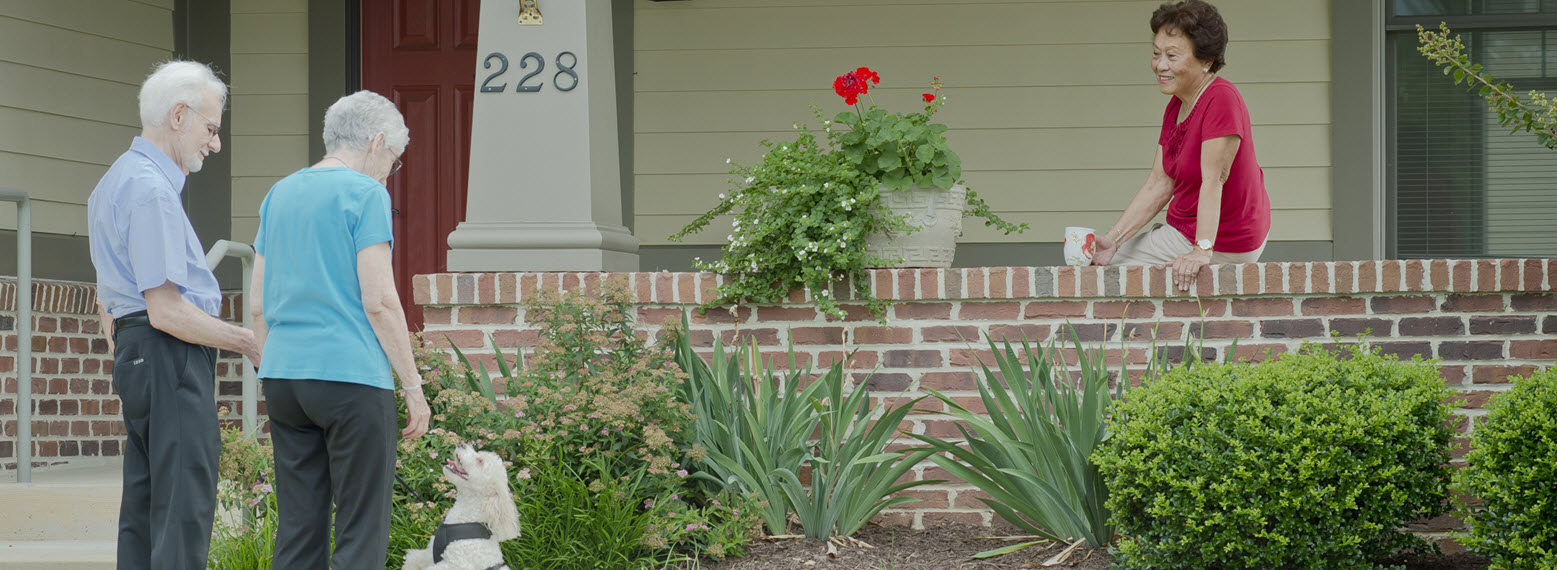
How Social Connections Keep Seniors Healthy
Published: April 17, 2024
The biological need for socialization dates back to the 1940’s when Abraham Maslow’s Hierarchy of Needs Pyramid concluded that humans need to feel a sense of belonging, acceptance, and connection to other people, not just family. Without it, people become susceptible to loneliness, depression, and anxiety.
A key goal of senior living, and especially continuing care retirement communities, is to foster engagement and connection through the campus design, programs and services. The value of this grows as we become older and often face more physical limitations and lose existing social networks.
Socialization and senior health
Well-run senior living and assisted living communities follow a philosophy of multi-dimensional wellness, starting with creating a community environment where people feel safe, and ensuring that the programs and events they offer touch on physical, mental, social, emotional, and cognitive well-being.
Residents’ vocations are also incorporated into the communities’ offerings as they work with campus administration to create clubs and initiatives on issues they are passionate about. Youth mentoring and tutoring, wildlife conservation, delivering Meals on Wheels, and protecting the Chesapeake Bay are just a few areas where Asbury residents have used their professional experience to create something new at the community they join. Providing additional opportunities for seniors to stay engaged in the world around them and feeling purposeful are positive side effects of the expanded social networks they gain after moving.
Think of socializing as a whole-body exercise for the mind. It’s not just about doing one thing, it’s about doing many things in many ways – recalling memories, having conversations, meeting someone who shares the same interest, listening and thinking about responses, and reading reactions and recognizing emotions. Joining in a group event, even if it is online, or conversing one-on-one gets a lot of gears moving in the brain, with positive effects on your overall wellness.
Better nutrition – Seniors who stay social are more likely to eat more regularly, maintaining a better diet and keeping their body powered for activity, which in turn contributes to better overall physical health. (The Journals of Gerontology®)
Better sleep – Seniors who are feeling less lonely tend to keep better routines and sleep schedules, which helps to optimize their physical wellness. (National Institute on Aging)
Better physical function – Seniors who keep socially active, including exploring new social opportunities, tend to be physically more active thanks in part to the format of many social activities like walking groups, aerobics, crafting, and more. These bodies in motion experience additional health benefits such as lower blood pressure, less joint stiffness, slower loss of bone or muscle tissue, better circulation which also benefits their brain, and boosted immune systems. (Mather Institute Age Well Study)
Better cognitive function – Seniors who maintain communication with others are more likely to maintain cognitive function for longer than those who do not engage in forms of communication regularly. (Stanford Health)
Better mood – Seniors who engage in social connections several times a week tend to be happier, keep a lighter mood, feel less stressed and more supported, are more confident, and maintain a more positive outlook. (The Harvard Study on Aging)
Asbury strives to maintain retirement lifestyles full of activity, socialization and purpose for residents, offering countless opportunities to make new friends, gain new skills and have novel experiences – which promote brain health – and do more of what they enjoy.
“Feeling socially isolated can be as toxic to healthy brains and bodies as smoking,” says Laura L. Carstensen, director of Stanford University’s Longevity Center. “It’s important to find the right environment that provides the right kind of social engagement and connection. Especially for seniors.”
Research shows these top 10 benefits of social engagement
- Higher levels of social support and lower levels of loneliness
- Positive perceptions of social relationships lead to higher levels of overall health
- Loneliness can lead to depression, anxiety, and feelings of isolation
- Social environments stimulate important brain functions that impact overall wellness
- Isolation can lead to cognitive decline
- Social stimulation promotes brain health
- Greater feeling of neighborhood cohesion enhances mental well-being
- Staying active in social settings promotes more focus on physical wellness and nutrition
- Social settings improve mood and happiness
- Social happiness improves sleep quality
With a 90-plus year legacy of serving seniors, Asbury Communities understands the importance of socialization – and other key factors to aging well. Moving to a senior living community before you ‘need’ to is the best way to develop a strong social network and benefit from the community’s focus on wellness and engagement. Learn how Asbury communities are continuing to provide social, wellness-focused opportunities for residents by contacting a retirement counselor today or by contacting us through our online form here!
